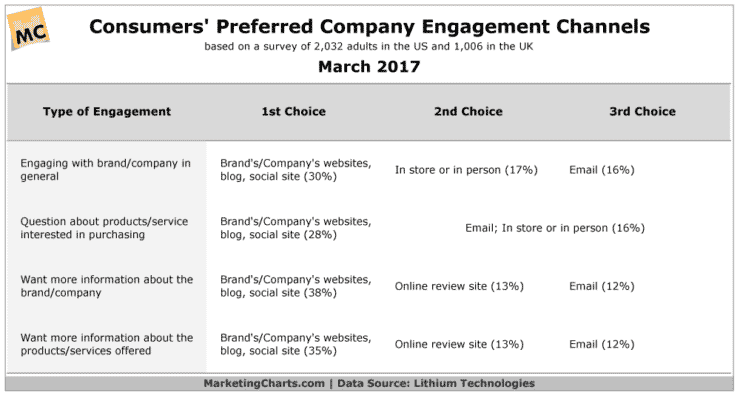
New research suggests that the main way in which people want to engage with your business is through your website. They don’t want to talk to you or meet your representatives in person. Instead, for a variety of different purposes, your potential customers prefer to engage with your business solely through your website.
The findings come from Lithium, a company that helps businesses build client relationships. The research discovered that engagement through a website was the preferred method for generally engaging with any brand or business. However, a website was also the number-one choice for getting answers to questions about products and services, as well as for getting detailed information. In other words, a general website that provides an “overview” of a company is insufficient. What people are after is detail – and lots of it.
The study also revealed another interesting twist to the information requirements of customers and potential customers. This was dependent on what you might call the direction of travel. When an individual wanted to find out information about a company or a product or service, they clearly preferred a website. However, when the information was being sent out by the firm, instead of the individual looking for it, then email came out on top, way ahead of alternatives such as social or direct mail.
This all suggests your business needs to concentrate on two things:
- A highly detailed website that answers every possible question that a customer or potential client might ask
- An email marketing strategy that communicates well and provides the information customers want
The psychology of detail
The reason that people prefer websites over personal communication is the need for depth. Humans are risk averse. We want to do things with the least possible risk; it is part of our survival instincts. Spending money, making decisions about which service to use or which products to purchase involves risk. We may spend the money on the wrong item, or we may get into a relationship with a service provider that is not as good as we thought. Hence, our brains try to minimise those risks.
The way we reduce the risk of making wrong buying decisions is to get as much information as possible. In the “olden days” before the invention of the web, the only way to get the detail we needed was to have several conversations with sales people. But even then, we didn’t always get what we wanted to help us understand the level of risk. Now, with the Internet, we can get an endless amount of detail, all of which we use to reduce the risk of purchase.
This is why people prefer websites to personal communication. It helps us think we are minimising the risk of purchase and risk reduction is a strong motivator.
What this means for website owners is that if you do not include enough detail about everything you sell, then your visitors can easily find out that detail. They can go to comparison sites or review sites – meaning you are no longer in control of the information these potential clients receive. Or your visitors can hop over to Twitter or Facebook and ask their friends what they think about you. The reason people do this is that they are seeking the additional detail that is not present on many websites.
The more detail you have about your products and services, the more likely it is that people will stay on your website and not venture elsewhere for risk-reducing information.
Businesses that only provide an overview and believe that people will contact them if they want to know more are missing out on potential business. People do not do this. Instead, they use the web to gather that additional detail they need. If your website doesn’t provide the level of detail that people want, you lose them.
This new research shows clearly that people are relying on your website to tell them everything they need to know about your products and services. The question is, are you providing enough detail to stop them seeking that information elsewhere? The study shows your website is crucial in communicating with your customers; are you making the most of your site?






